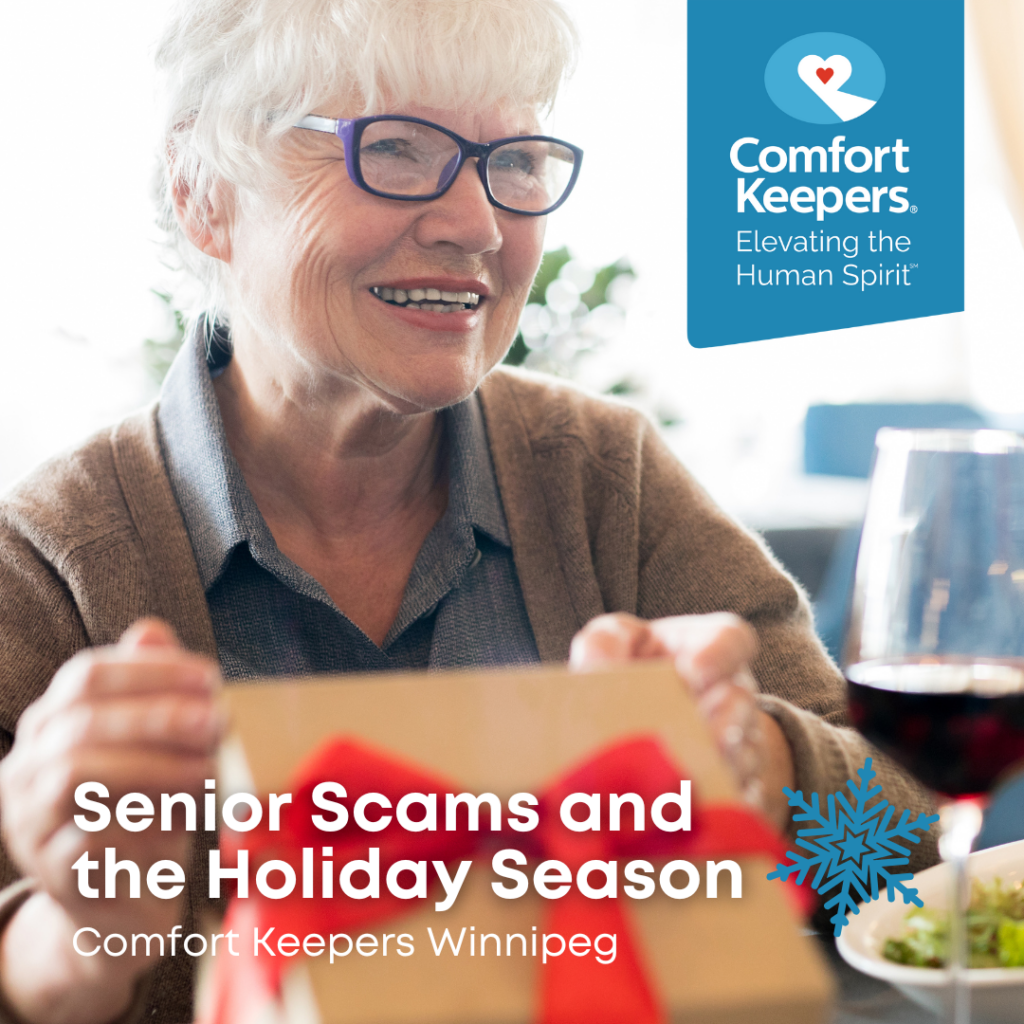Senior Scams and the Holiday Season: What Families and Caregivers Should Look Out For
Winnipeg Senior Home Care | December 17, 2024

What Every Senior in Winnipeg, MB Needs to Know About Preventing Holiday Scams
When it comes to senior scams and the holiday season, it seems that no matter where we turn, a nefarious individual or group is looking to take advantage. Scammers and con artists are all around and the holiday season seems to inspire more. To make matters worse, the scams are becoming more sophisticated in their approach.
As society relies more heavily on technology, sometimes a wrong click on the wrong link compromises one’s personal information.
Senior Scams and the Holiday Season FACTS: #DYK The Canadian Government reports that from January 2014 to December 2016, Canadians aged 60 to 79 lost almost $28 million to various scams.
The holiday season is a time of giving, charitability, and all-around goodwill – but all of that can make us more vulnerable to the schemes that are out there. Seniors are certainly no exception. It’s common for scammers to target seniors because they often have large nest eggs and exceptional credit scores, but little financial management. Additionally, memory issues and cognitive decline may make seniors more likely to give up valuable information.
Senior Scams and Fraud Protection
According to CPA Canada’s Fraud Protection for Seniors webinar, seniors are targeted more frequently because they: are home, often alone, all day; may feel lonely, isolated and overly trusting; struggle with health issues, and have more readily available money. Fraudsters play off these vulnerabilities.
Knowing what to look out for can save seniors from having their finances or even identity compromised. Below are some of the more common scams that target older adults during the holiday season. Share these with senior clients so that they can stay guarded and safely enjoy the holiday season.
Common Holiday Senior Scams for Families to Watch Out For
#1. “Emergency” Calls:
This tactic, which has gained considerable traction over the last few years, involves the scammer calling a senior, claiming to be a grandchild or other family member in need of money. They often say that they’ve been arrested, in an accident, or just need emergency funds in general. Seniors who receive such calls should ask specific questions that will trip up the caller. In most cases, the scammer will not be able to answer these questions and hang up in frustration. When in doubt, the best thing to do when an unknown number pops up is to simply not answer.
#2. Phony Email Offers:
Most personal email inboxes are full of promotional offers, and this certainly ramps up during the holidays. First and foremost, if the offer sounds too good to be true, it probably is. Scammers create emails that look legitimate but contain links that lead to pages requesting personal information. Seniors should look every promotional email offer over carefully, paying close attention to the sender’s address (it should have a proprietary address such as @amazon.com or @target.com) and anything unusual like misspellings. A good rule of thumb when it comes to entering sensitive information into any website is to ensure that the URL begins with “https.” This signifies that the site is secure and encrypted.
#3. Free Gift Cards:
Speaking of offers that are too good to be true, seniors may come across emails or flashy website ads that advertise free gift cards. While some companies have deals where you receive gift cards after purchase, you can safely assume the ones that say ‘free’ without purchase are entirely illegitimate. Seniors should not click on the accompanying links or ads for these offers.
#4. Illegitimate Charity:
It’s the season of giving, but it’s important to know where exactly your charitable donations are going. Seniors should be wary of any unfamiliar organizations or those whose appeals are overtly emotional. To confirm the legitimacy of an organization, seniors can utilize the website Give.org.
Comfort Keepers® Winnipeg Can Help
The holiday season is the perfect opportunity to spend time with friends, family, neighbours, and all others who bring joy to our lives. That makes it all the more difficult to imagine that there are those out there who wish to rob people of that joy – but they are out there.
At Comfort Keepers®, we aim to preserve the joy, warmth and wonder that seniors and other adults cherish during the holiday season. We will work to reduce their risk of being conned, not only from the schemes above but also any others that may exist. Our caregivers can also provide help with togetherness tasks and daily routines.
Comfort Keepers® Winnipeg Offers a Wide Range of Private Home Senior Care Services
For families concerned about the health and well-being of aging loved ones, we can help with homecare services including, Alzheimer’s and dementia care, in-home personal care, respite care, specialized care, in-home nursing, end-of-life care, senior living transition services, and much more!
Comfort Keepers® professional caregivers provide services to ensure safety, health, and happiness without the stress of moving to an assisted living or rehabilitation facility. Individually tailored care plans account for living arrangements, medical issues, physical restrictions, personalities, expectations, and more.
Our Interactive Caregiving™ Approach Enables Top-Notch Homecare
The Interactive Caregiving™ provides a system of care that addresses safety, nutrition, mind, body, and activities of daily living (ADLs). Our compassionate caregivers can provide a personalized home care plan for your loved one, allowing them to enjoy a healthier, safer, and more meaningful retirement at home.
Comfort Keepers® is the Most Trusted Name in Senior Care in Winnipeg
Our in-home caregivers ensure our seniors are physically, socially, and mentally engaged. In addition, we provide options, activities, events, and resources for seniors that might otherwise not be available.
Locally Owned and Operated In-Home Personal Care for Seniors
Our caregivers live and work in the Winnipeg area. We know the area and how to assist our clients using local resources. Comfort Keepers® Winnipeg is here to help you and your loved ones get the best care possible. If you live in Winnipeg and require homecare services for senior personal care and wellbeing, contact Comfort Keepers® at (204)-488-4600.
Accredited Home Care for Seniors in Winnipeg
Comfort Keepers® Winnipeg is accredited with Exemplary Standing with Accreditation Canada. Accreditation is an intensive process in which industry experts examine an organization’s processes, policies, and procedures against quality standards. To achieve accredited status, Comfort Keepers® offices met or exceeded the rigorous standards for Home Care companies, as defined by Accreditation Canada.
Individualized Home Care Options
Long-Term Home Care, 24 Hour Home Care & Short Term Care Options Customized for You







